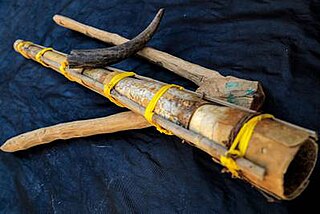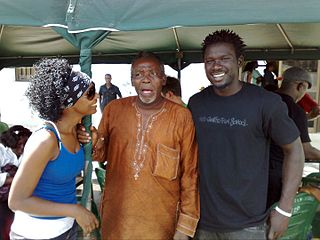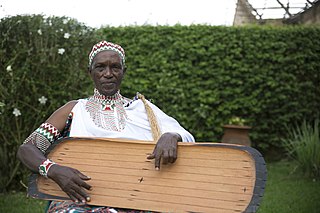Related Research Articles

The xylophone is a musical instrument in the percussion family that consists of wooden bars struck by mallets. Like the glockenspiel, the xylophone essentially consists of a set of tuned wooden keys arranged in the fashion of the keyboard of a piano. Each bar is an idiophone tuned to a pitch of a musical scale, whether pentatonic or heptatonic in the case of many African and Asian instruments, diatonic in many western children's instruments, or chromatic for orchestral use.

Arua District is a district in the Northern Region of Uganda. Like many other Ugandan districts, it shares its name with its administrative center of Arua. The name Arua is said to be derived from the Lugbara name for prison (Arujo) and prisoner (Aru), since the white settlers had a detention center at Arua Hill.

The Lugbara are a Central Sudanic ethnic group who live primarily in the West Nile region of Uganda, in the adjoining area of the Democratic Republic of the Congo (DRC) with a few living in South Sudan. They speak the Lugbara language, a Central Sudanic language similar to the language spoken by the Madi, with whom they also share many cultural similarities.

In many parts of sub-Saharan Africa, the use of music is not limited to entertainment: it serves a purpose to the local community and helps in the conduct of daily routines. Traditional African music supplies appropriate music and dance for work and for religious ceremonies of birth, naming, rites of passage, marriage and funerals. The beats and sounds of the drum are used in communication as well as in cultural expression.
The chromatic trumpet of Western tradition is a fairly recent invention, but primitive trumpets of one form or another have been in existence for millennia; some of the predecessors of the modern instrument are now known to date back to the Neolithic era. The earliest of these primordial trumpets were adapted from animal horns and sea shells, and were common throughout Europe, Africa, India and, to a lesser extent, the Middle East. Primitive trumpets eventually found their way to most parts of the globe, though even today indigenous varieties are quite rare in the Americas, the Far East and South-East Asia. Some species of primitive trumpets can still be found in remote places, where they have remained largely untouched by the passage of time.
Lugbara, or Lugbarati, is the language of the Lugbara people. It is spoken in the West Nile region in northwestern Uganda, as well as the Democratic Republic of the Congo's Orientale Province with little extend to the south Sudan as the Zande or Azande people.

The gourd mouth organ is a free reed mouth organ played across East and Southeast Asia. It consists of a gourd wind chest with several bamboo or bronze pipes inserted on top of it, the numbers of pipes differing from region to region.
The amakondere is a type of natural trumpet found in Uganda and Rwanda.

The wazza, also referred to as al-Wazza, is a type of natural horn played in Sudanese music. The wazza is a long wind instrument, constructed by joining several wooden tubes to form an elaborate gourd trumpet, and while blown, it is also tapped for percussive effect. Characteristically, it has been used by the Berta people of the Blue Nile State in Sudan. Across the Blue Nile State communities, it has been use for generations to guide in the harvest season.

Taonga pūoro are the traditional musical instruments of the Māori people of New Zealand.

Lugbara cuisine is one of the meals of East Africa and the ancient Lado Enclave. The Lugbara people of northwestern Uganda and northeastern DR Congo eat not only vegetable dishes, but also animals like goats, cows plus ope (guineafowls) and catch insects like onya for food which is called nyaka in the standard Lugbara language used in Arua. Cassava flour, sometimes mixed with millet or sorghum like posho or ugali, is the staple food and is called enya(sa) and accompanied with a range of soup dishes. Rice, yams, potatoes and matoke are also eaten. Below is a list of some of the Lugbara-styled delicacies found in West Nile Restaurants, Ariwara Town, Arua Park in Kampala and many homes or cafeterias that cherish traditional Lugbara cuisine.

Okuyo Joel Atiku Prynce is a Ugandan actor, model, photographer and lecturer at Uganda Christian University where he graduated with a Bachelor of Social Work and Social Administration (BSWSA) plus Makerere University, the Best Two Campuses in Uganda. His film acting breakthrough came when he was cast as the Devil's reincarnation in Ugandan director Matt Bish's 2007 Film Battle of the Souls, a popular Ugawood Movie. It was based on the real-life story of the director's brother, KFM Radio Presenter Roger Mugisha. Prynce is also the President of his own company The Lhynnq-X, Inc. Born in Arua on 4 December 1983 to a Lugbara couple, the late Lt.Colonel Gabriel Francis Atiku and Yema Drakuru Atiku, his debut villain role won him over five international accolades including Best Supporting Actor at the Balafon Film Festival in Bari, Italy (2008) and 2009's Best Actor in Supporting Role at the Africa Movie Academy Awards (AMAA) in Lagos, Nigeria. Other awards include Best Actor at both Ubuntu Village, Colorado (USA) in 2010 and the 2011 Zanzibar International Film Festival [ZIFF] in Tanzania. Ugandan newspaper The Observer labelled Okuyo Africa's Brad Pitt.
Tara is a subcounty at the north-eastern end of Maracha District of Uganda. It is an area endowed with rocks and is neighboured in the Northwest by Koboko; to the Northeast by Yumbe; to the East by Omugo subcounty plus to the South by Nyadri. Other subcounties in Maracha include Yivu, Aiivu, Oleba, Uriama, Omugo and Nyadri.
Agofe is the noble title for the chief cultural leader among all the Lugbara people or King of Lado Kingdom which covers the regions of West Nile, Ituri, Torit, Uele and Yei. The term means 'Pillar' or 'Paramount Chief' but a king is also called opi in Lugbara; an opi is usually the clan leader of a lineage. Around 1967, President Milton Obote abolished kingdoms, then the 1995 Constitution reinstated cultural institutions but the Lugbara only chose county chiefs. In 2012, the Government of Uganda finally recognised this revised Agofe institution. The Agofe's duty will be to preserve Lugbara culture through literature and other assignments.
Black Harmony is a Lugbara music duo based in Arua. It comprises Emmanuel Ledra who sings and raps while Robert Adima provides the "reggae flavour".
Jackie Chandiru is a Ugandan musician popularly known by the polynym "Queen Of The Nile". She was the lead member of the girl music group Blu*3, based in Kampala, Uganda's capital and largest city. In 2014, she was a featured artist in "Coke Studio Africa".

Trough zithers are a group of African stringed instruments or chordophones whose members resemble wooden bowls, pans, platters, or shallow gutters with strings stretched across the opening. A type of zither, the instruments may be quiet, depending upon the shape of the bowl or string-holder. Sound is often amplified with the addition of a gourd resonator. Instruments have been classed into five different types, based on shape.
Lugbara Kari refers to the official traditional and cultural institution of all Lugbara people on Earth and headed by the Agofe.
Voice Of Life (Arua) is a church-oriented Ugandan broadcast station based in Arua since 1997. Also referred to as VOL, it was the first FM radio channel in West Nile, five years after the first in Uganda's capital Kampala. The offices are on the northwestern top of Arua Hill at Plot M47 Independence Road which runs behind Arua Hill Park.
References
- ↑ "Kebu" . Retrieved 20 March 2014.
- ↑ "Lugbara People and their Culture in Uganda". Archived from the original on 2013-05-15. Retrieved 2014-04-04.
- ↑ Suburb2suburb Archived 2014-06-06 at the Wayback Machine
- ↑ Tour of Light 2006
- ↑ Daniel Kaweesa Goes Home A Millionaire Archived 2014-09-24 at the Wayback Machine
- ↑ "Arua Music" . Retrieved 20 March 2014.